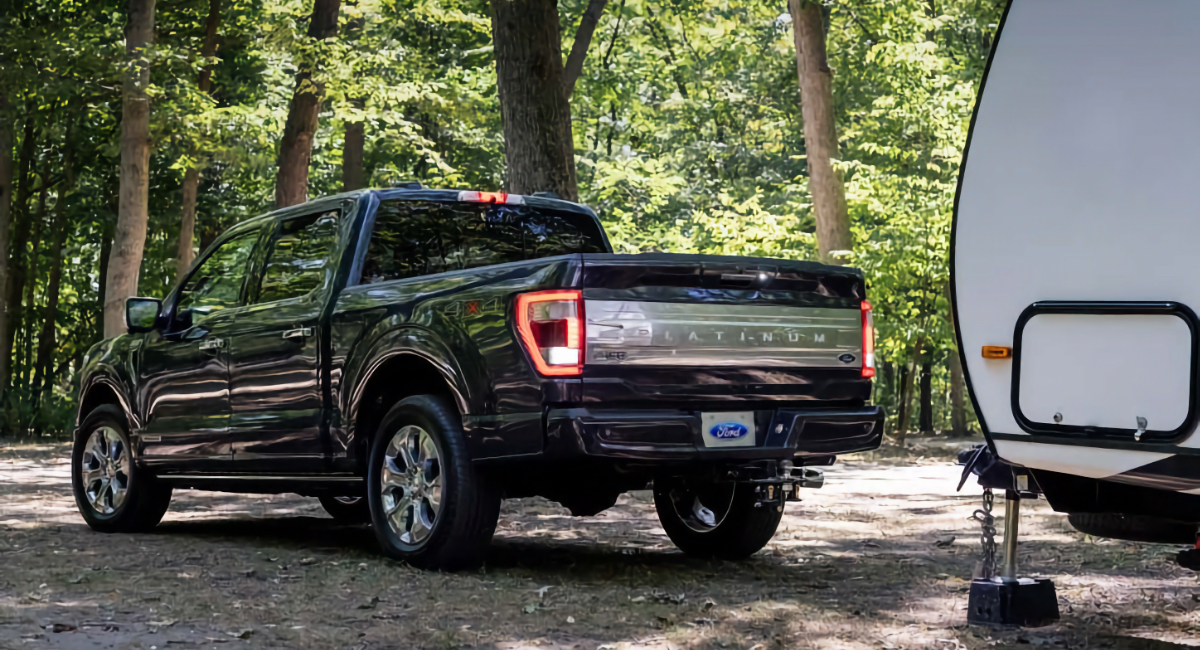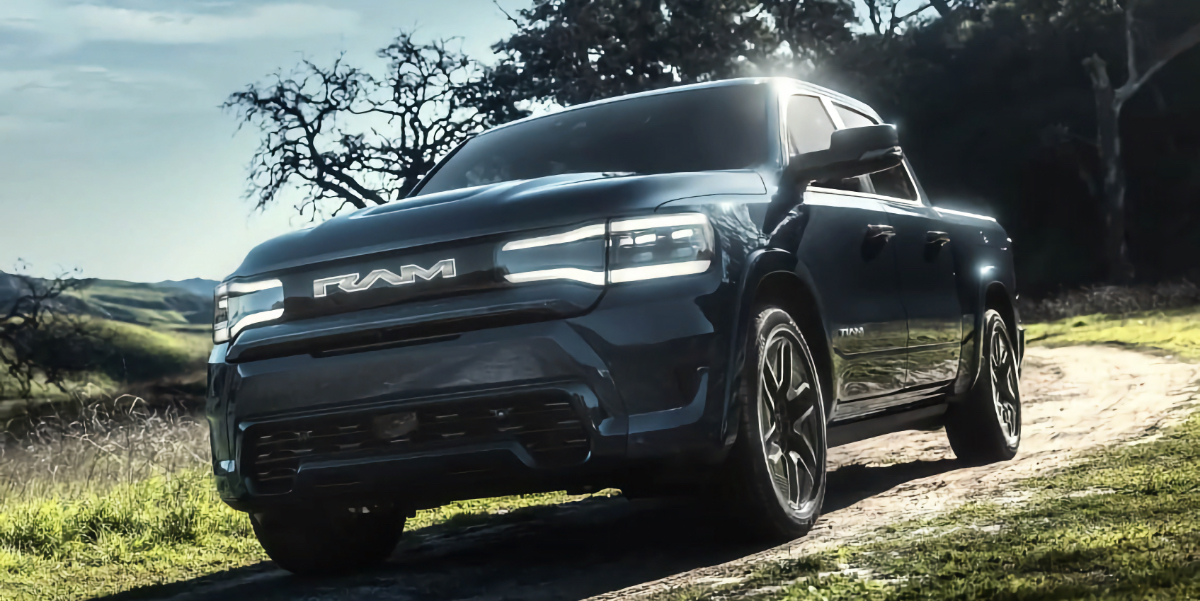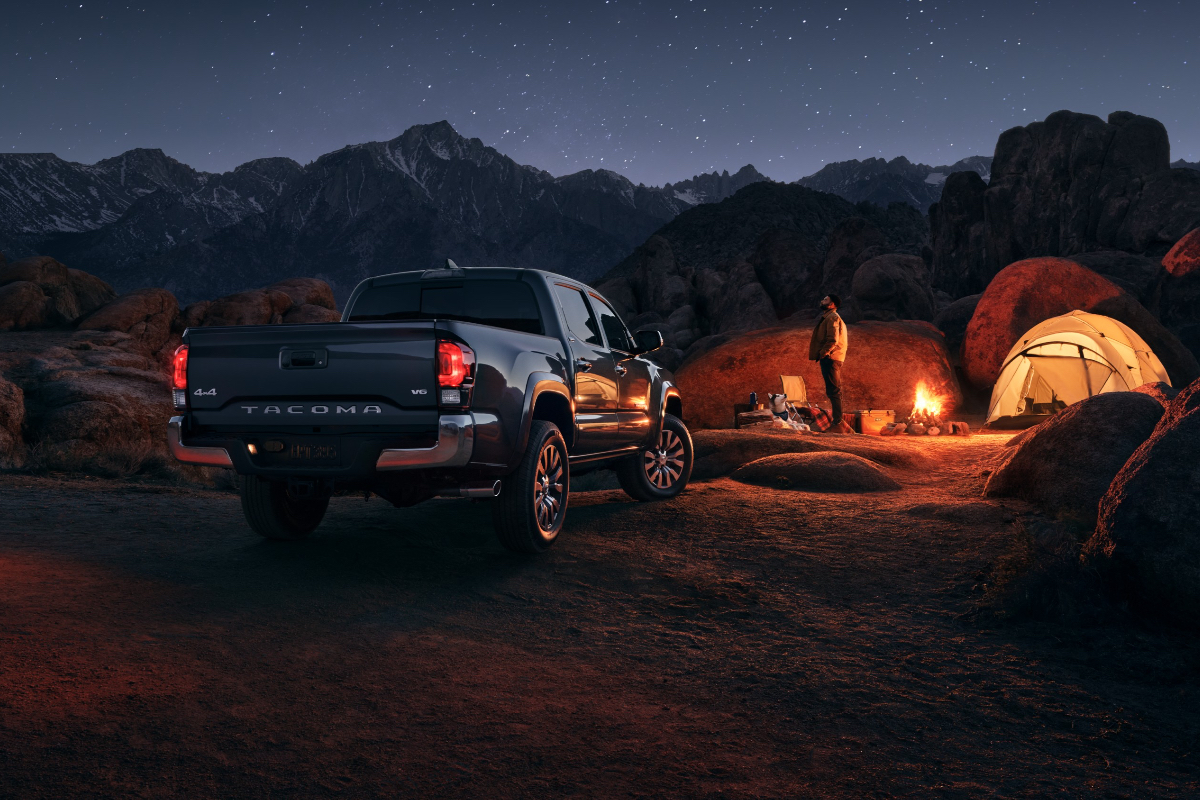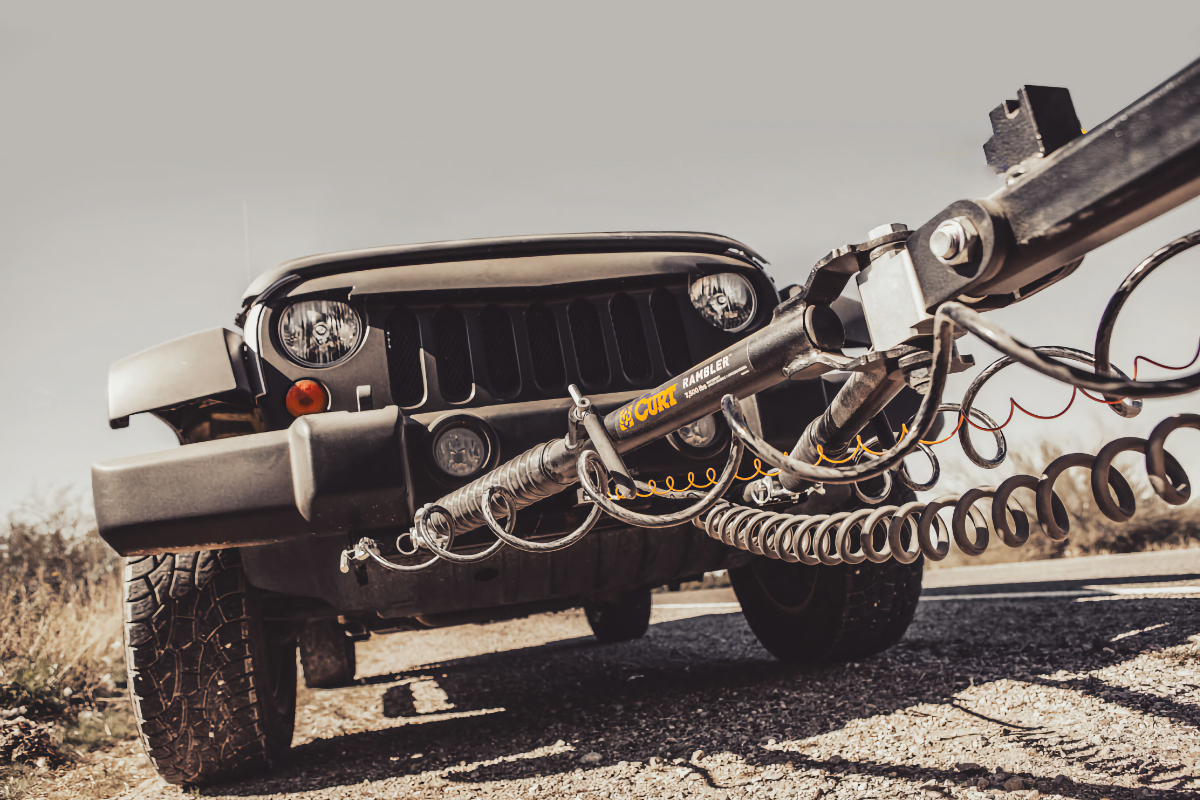How to Pair a Tow Vehicle and Trailer
Image Caption:
Whether you’re entering the RV lifestyle or are a seasoned veteran, choosing a new — or new to you — trailer and tow vehicle can be a challenge. There are so many choices out there in travel trailers and fifth-wheels, and in tow vehicles ranging from small SUVs that can tow 3,500 pounds to diesel-powered heavy-duty trucks that can pull literally 10 times that. So what’s the best way to pair the right truck and trailer for your needs?
That depends on multiple factors. RVers shopping for a trailer can be broken down into three basic categories: Those who have a tow vehicle but not a trailer, those who are interested in or own a trailer and are looking for the right vehicle to tow it with, and those who don’t have a tow vehicle or a trailer yet. Let’s break those down.
What if You Already Have a Tow Vehicle
If you already own a vehicle that’s suitable for towing, the odds are you’d like to match it with a trailer rather than choosing an all-new tow vehicle. If that’s the case, the first step is to determine the vehicle’s tow rating, based on equipment and options. If you bought the vehicle new, you probably know how it is equipped; if not, or you bought the vehicle used, your local dealer should be able to help determine its tow rating based on the vehicle identification number (VIN).
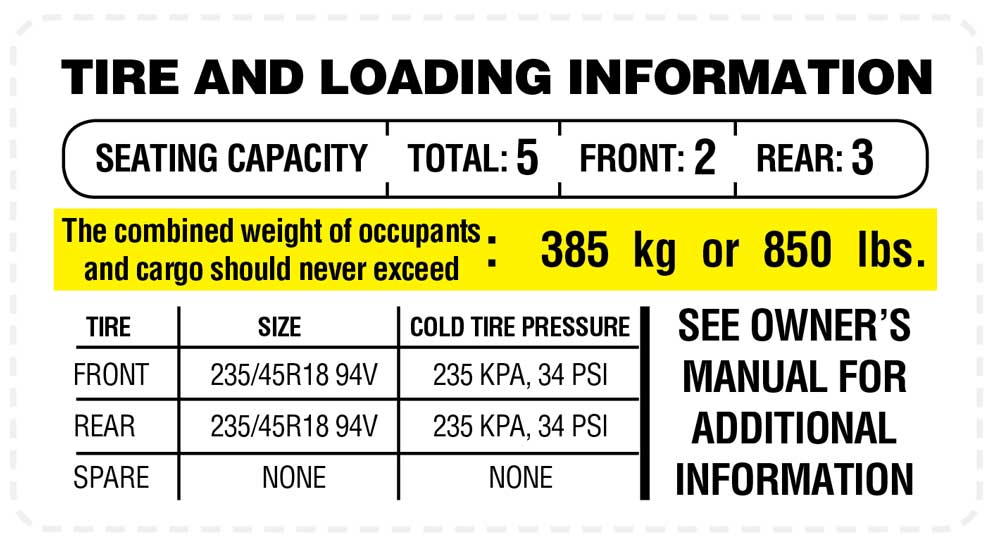
Payload capacity can be found on the Tire and Loading Information label on the driver’s doorjamb.
You may also be able to enter the VIN number in an online search and find out how it is equipped. Owner’s manuals are also available for free online, and downloading a free copy of the annual Guide to Towing for your vehicle’s model year.
These guides break down each vehicle by all the equipment that affects a tow rating so you can find the exact rating for any given vehicle. An owner’s manual will not always contain this kind of specific detail, although it may list the maximum tow rating available for the vehicle.
How to Pair the Right Trailer
Once you’ve established the tow rating, you can begin shopping for a trailer. Whether you’re looking at travel trailers or fifth-wheels, the most important consideration is how much it weighs. All trailers should have labels that display the gross vehicle weight rating (gvwr) and the cargo carrying capacity (ccc). Since it’s highly unlikely that you’ll be able to weigh the trailer before purchase, your best bet is to use the labels, and especially the yellow ccc label as your guide. If the trailer’s gvwr is within the vehicle’s maximum tow rating, you can be confident that you’ll be in compliance as long as you don’t overload the trailer. Remember that fuel weight is included in the ccc calculation, but water (in the freshwater tank and the water heater) is considered cargo. The label should tell you the weight of the water the unit can carry, but if not, simply add the capacity of the freshwater tank and water heater, and multiply the sum by 8.33 (pounds per gallon).
The other consideration is the tow vehicle’s payload rating (gvwr minus vehicle curb weight), which is the maximum allowable weight for both cargo and passengers. The payload capacity of the vehicle can be found on the Tire and Loading Information decal inside the doorjamb or edge of the driver’s door, or in the vehicle owner’s manual. The owner’s manual may not have specifics for each vehicle configuration, so it’s always best to take the tow vehicle to a public scale to learn its true weight.
Consider that a travel trailer places around 10 percent of its weight on the vehicle’s hitch, while a fifth-wheel will put around 20 percent of its weight in the bed of the truck (pin weight). Calculate that figure (based on potential loading, water-tank size/placement, LP-gas and battery weights), including passengers and typical cargo, and make sure the payload rating isn’t exceeded.
The gross axle weight rating (gawr), the maximum weight the axle is designed to carry, must also be considered when matching a tow vehicle to the trailer. Keeping tabs on the rear-axle weight and payload is important, and adding a lot of heavy cargo in the back of the tow vehicle can create rear-axle overloading. A couple of motorcycles, tools and a generator, in addition to the trailer’s hitch weight and passengers, could put the truck in an overweight condition.
With a fifth-wheel, gawr and payload ratings are a greater concern, especially with larger fifth-wheels, simply because more weight is shouldered by the truck. When towing a travel trailer, hitch weight can be effectively reduced with the use of a weight-distributing hitch. If the trailer you’re considering won’t violate the tow rating, payload, gawr or gvwr of the tow vehicle, you’re good to go.
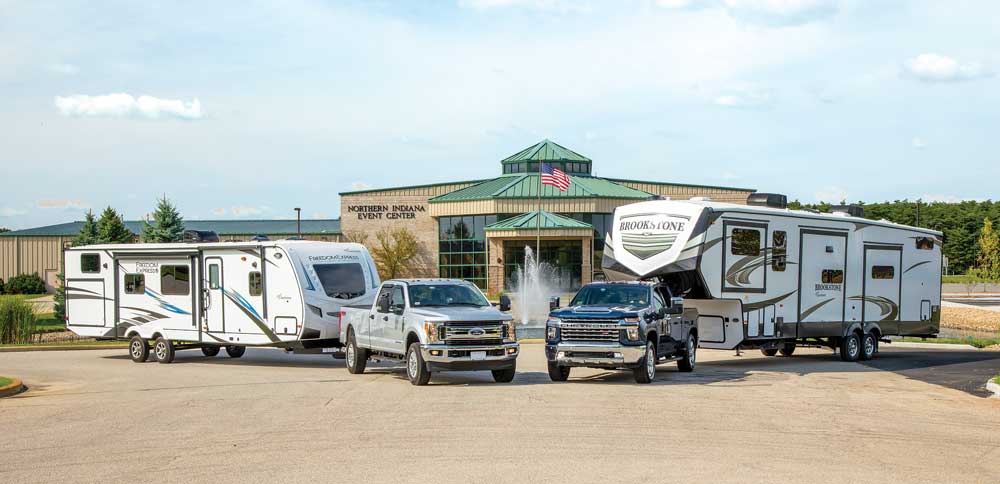
What if You’ve Already Found Your Dream Trailer
Oh, how we can get carried away walking through the rows of gleaming trailers at a dealer’s lot or an RV show! You went in thinking of a simple travel trailer, and before you knew it, you were standing before a 35-foot fifth-wheel with three slideouts and full-body paint, ready to sign some paperwork. Hold on just a second. Aside from considering your budget (and your marriage), it’s important to think about what kind of vehicle you’ll need to tow that dream RV.
Purchasing the trailer first gives you the freedom to get everything you want without worrying about how much it weighs — for the most part. Before you sign on the dotted line, however, it’s important to take into consideration what tow vehicle will be required to pull that new trailer. If you’re comfortable driving a heavy-duty truck or dually as the second family vehicle, and the purchase price and cost of ownership are of no concern, then the sky’s the limit. Otherwise, think about the kind of tow vehicle you can afford and would be happy driving before making your final decision.
That being said, the tow rating of the vehicle you’re considering should be the primary consideration. If the new trailer has a gvwr of 20,000 pounds, you’ll want a vehicle that can tow at least that much. Auto dealers are usually more concerned with making a sale than anything else, and many salespeople don’t know much about towing or weight ratings. They may also try to sell you what they have on the lot, rather than order a vehicle that’s more up to your required specifications, so do your own research and don’t compromise for the sake of convenience.
When you’re shopping, check out the gvwr, gawr, gross combined weight rating (or gcwr, the maximum allowable weight of the truck and trailer) and payload of the vehicle you’re considering to make sure that everything’s up to the task. Usually, a vehicle that has a sufficient tow rating will also have enough capacity in these other areas, but not always. For example, a half-ton truck may be rated to tow more than 12,000 pounds, but a fifth-wheel weighing that much may exceed the payload and/or rear gawr.
Paying attention to gvwr and payload ratings is especially important if you plan to haul a slide-in truck camper in the future. Camper manufacturers also post weight figures for their products, normally including calculations for the weight of fresh water and LP-gas and sometimes optional accessories, so you can make an informed decision about a suitable matchup. (For more on camper-hauling truck selection, see the sidebar on page 8.)
What to Consider in a Car Towing Trailer
Once you’re sure you’ve found a capable tow vehicle, take some time to consider the options. Leather and dual-zone climate control are nice, but that’s not what we’re talking about here. If a towing package is optional, get it. It’s usually not a lot more money, and it includes equipment that will make the tow vehicle more capable of handling the weight. Towing packages vary, so be sure to ask what it includes. For example, some packages don’t provide towing mirrors, which makes no sense.
Newer tow vehicles, especially with heavy-duty designations, often have useful options that make towing easier, including camera packages, hitch-guidance systems, integrated tow-brake systems and other features. If you’re shopping for a truck that can tow a fifth-wheel, you might consider one that is fifth-wheel prepped with a puck mounting system, which allows you to easily install and remove the hitch in minutes. Some manufacturers even make the hitch itself available, but we recommend doing some research and finding the best hitch for your needs, as a variety of designs and weight ratings are available.
What if You Don’t Have a Tow Vehicle or Trailer Yet
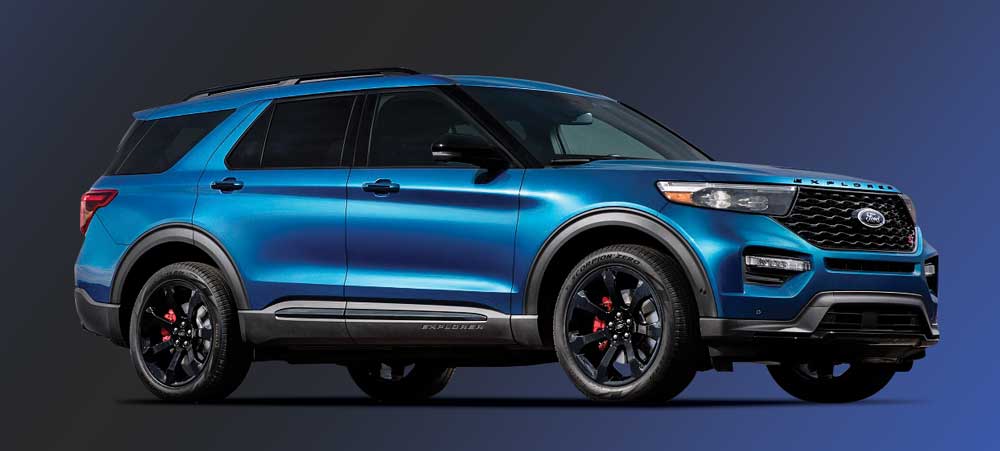
Towing a smaller, lighter travel trailer gives you more tow-vehicle options, from light pickups to sporty SUVs like the new Ford Explorer ST.
Unlike the previous scenarios, the first consideration here should be your budget and how you want to allocate it. For some buyers, the trailer is the priority, and just about anything that can tow it safely will be just fine. For others, the tow vehicle will also be a second family vehicle, and the trailer will be used only a few times a year. In the latter case, a buyer might be happy with a nice tow vehicle and a simpler trailer more suitable for short-term trips.
Which should you choose first? From a practical standpoint , you will probably spend a lot more time in the tow vehicle than the trailer, and it will be doing all the work, so it makes sense to get what you really want and need. On the other hand, if you know what you simply must have in a trailer (for example, a toy hauler large enough for a side-by-side), buy it first and then choose the right truck to haul it.
Consider Your Camping Style

Going off the grid? A number of tow-vehicle choices can take you almost anywhere, among them the all-new Jeep Gladiator.?
It’s smart to think about how (and where) you plan to use your new combo, and how it will be stored. If you’re going to be pulling a toy hauler or traveling during the winter months, a four-wheel-drive vehicle will be a good decision and won’t add much to the price tag (though some insurance companies will charge a higher premium for a four-wheel-drive, so check with the carrier first).
If you want to have the freedom to camp anywhere, don’t choose a trailer longer than 20 feet or so. Not all campsites, for example, may be able to accommodate longer trailers, which may be difficult to maneuver on tight access roads.
Lastly, think about storage. Will you keep the trailer at your house? Then don’t even bother looking at something that won’t fit in your garage, driveway or side yard. If you plan on storing the trailer off-site, check the rates at local storage facilities and decide whether you want outdoor storage, or if indoor storage is something you prefer and can afford.
Single or dual rear wheels?
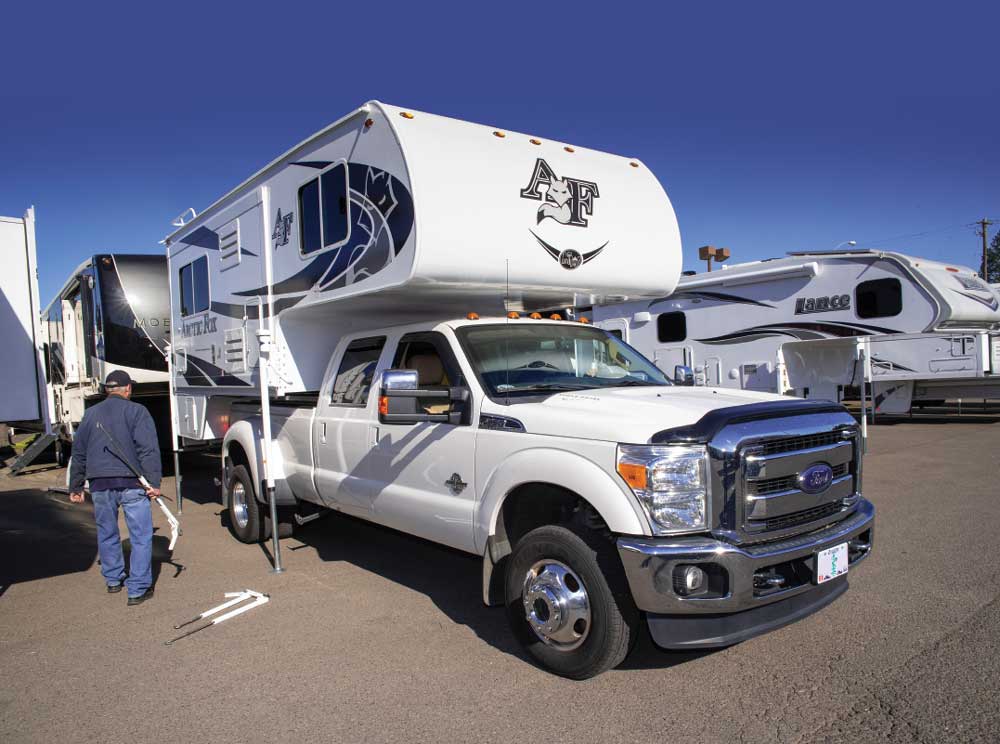
A dually used to be the obvious choice if you planned to tow a large fifth-wheel. But now that single-rear-wheel (SRW) three-quarter and one-ton trucks can tow well over 20,000 pounds, do you really need one?
As long as the SRW truck in question has adequate capacity to tow the trailer, then technically, no. However, there’s more to consider than just the tow rating. A dually’s extra set of rear wheels gives the truck substantially higher payload and axle capacity, keeps the truck more stable in sidewinds or when being passed by semitrucks, and provides a better safety margin in the event of a rear-tire blowout. A dually pickup is usually required if you’ll be buying a large slide-in truck camper, with its higher center of gravity, as the rear axle’s wider track provides more side-to-side roll resistance and stability. Choosing a dual-rear-wheel (DRW) option doesn’t add much to the price tag, but it can impact insurance rates and license fees.
On the other hand, a dually is wider and more difficult to park (especially in the city), takes up more room in the driveway or garage, and requires extra caution when rounding tight corners to prevent damage to the extended rear-fender dimensions. Because of the additional rolling resistance created by the extra tires, a dually will typically get poorer mileage when driving solo (differences in towing mileage will generally be marginal), and that extra rubber will also mean additional cost when it’s time for new treads. Lastly, vehicle registration and tolls are quite a bit higher with a dually than an SRW truck.

